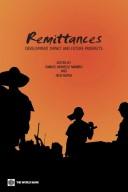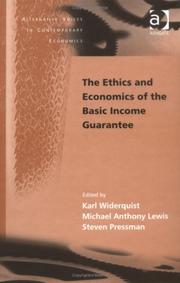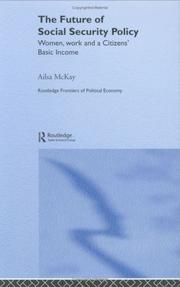| Listing 1 - 8 of 8 |
Sort by
|
Book
Year: 2005 Publisher: [Washington, D.C. : World Bank,
Abstract | Keywords | Export | Availability | Bookmark
 Loading...
Loading...Choose an application
- Reference Manager
- EndNote
- RefWorks (Direct export to RefWorks)
"Minimum wages are generally thought to be unenforceable in developing rural economies. But there is one solution - a workfare scheme in which the government acts as the employer of last resort. Is this a cost-effective policy against poverty? Using a microeconometric model of the casual labor market in rural India, the authors find that a guaranteed wage rate sufficient for a typical poor family to reach the poverty line would bring the annual poverty rate down from 34 percent to 25 percent at a fiscal cost representing 3-4 percent of GDP when run for the whole year. Confining the scheme to the lean season (three months) would bring the annual poverty rate down to 31 percent at a cost of 1.3 percent of GDP. While the gains from a guaranteed wage rate would be better targeted than a uniform (untargeted) cash transfer, the extra costs of the wage policy imply that it would have less impact on poverty. "--World Bank web site.
Casual labor --- Minimum wage --- Poverty --- Transfer payments
Book
Year: 2005 Publisher: [Washington, D.C. : World Bank,
Abstract | Keywords | Export | Availability | Bookmark
 Loading...
Loading...Choose an application
- Reference Manager
- EndNote
- RefWorks (Direct export to RefWorks)
"Minimum wages are generally thought to be unenforceable in developing rural economies. But there is one solution - a workfare scheme in which the government acts as the employer of last resort. Is this a cost-effective policy against poverty? Using a microeconometric model of the casual labor market in rural India, the authors find that a guaranteed wage rate sufficient for a typical poor family to reach the poverty line would bring the annual poverty rate down from 34 percent to 25 percent at a fiscal cost representing 3-4 percent of GDP when run for the whole year. Confining the scheme to the lean season (three months) would bring the annual poverty rate down to 31 percent at a cost of 1.3 percent of GDP. While the gains from a guaranteed wage rate would be better targeted than a uniform (untargeted) cash transfer, the extra costs of the wage policy imply that it would have less impact on poverty. "--World Bank web site.
Casual labor --- Minimum wage --- Poverty --- Transfer payments
Book
Year: 2005 Publisher: [Washington, D.C. : World Bank,
Abstract | Keywords | Export | Availability | Bookmark
 Loading...
Loading...Choose an application
- Reference Manager
- EndNote
- RefWorks (Direct export to RefWorks)
"Access to transfers and credit, whether cash or in-kind, is a major source of poverty alleviation and income generation in many developing countries around the world. Women may especially benefit from transfers and credit in countries such as Bangladesh, where they often have few work alternatives. In this paper, the authors descriptively examine the formal and informal financial sectors of rural Bangladesh, placing special emphasis on differences between men and women. Their analysis uses unique data on the credit and transfer behaviors of 1,800 households in rural Bangladesh. The authors focus on five important questions: * How important are the formal and informal financial sectors? * What are the primary sources of gifts and loans within those sectors? * Do men and women rely on different sources for finances (for example, formal versus informal) or different types of finances (for example, transfers versus loans)? * How have the financial sectors evolved during the 1990s? * What is the relationship between the formal and informal sectors? This paper--a product of the Gender Division, Poverty Reduction and Economic Management Network--is part of a larger effort in the network to integrate gender into economic policy work"--World Bank web site.
Credit --- Informal sector (Economics) --- Transfer payments --- Women in development --- Bangladesh --- Rural conditions.
Book
Year: 2005 Publisher: [Washington, D.C. : World Bank,
Abstract | Keywords | Export | Availability | Bookmark
 Loading...
Loading...Choose an application
- Reference Manager
- EndNote
- RefWorks (Direct export to RefWorks)
"Access to transfers and credit, whether cash or in-kind, is a major source of poverty alleviation and income generation in many developing countries around the world. Women may especially benefit from transfers and credit in countries such as Bangladesh, where they often have few work alternatives. In this paper, the authors descriptively examine the formal and informal financial sectors of rural Bangladesh, placing special emphasis on differences between men and women. Their analysis uses unique data on the credit and transfer behaviors of 1,800 households in rural Bangladesh. The authors focus on five important questions: * How important are the formal and informal financial sectors? * What are the primary sources of gifts and loans within those sectors? * Do men and women rely on different sources for finances (for example, formal versus informal) or different types of finances (for example, transfers versus loans)? * How have the financial sectors evolved during the 1990s? * What is the relationship between the formal and informal sectors? This paper--a product of the Gender Division, Poverty Reduction and Economic Management Network--is part of a larger effort in the network to integrate gender into economic policy work"--World Bank web site.
Credit --- Informal sector (Economics) --- Transfer payments --- Women in development --- Bangladesh --- Rural conditions.

ISBN: 0821357948 9786610155620 1280155620 0821357956 Year: 2005 Publisher: Washington, DC : World Bank,
Abstract | Keywords | Export | Availability | Bookmark
 Loading...
Loading...Choose an application
- Reference Manager
- EndNote
- RefWorks (Direct export to RefWorks)
Migration. Refugees --- Development aid. Development cooperation --- Developing countries --- Emigrant remittances --- Transfer payments --- Finance --- Funding --- Funds --- Economics --- Currency question --- Government transfer payments --- Payments, Transfer --- Expenditures, Public --- Income distribution --- National income --- Immigrant remittances --- Remittances, Emigrant --- Foreign exchange --- Government policy --- Accounting --- Emerging nations --- Fourth World --- Global South --- LDC's --- Least developed countries --- Less developed countries --- Newly industrialized countries --- Newly industrializing countries --- NICs (Newly industrialized countries) --- Third World --- Underdeveloped areas --- Underdeveloped countries --- Economic conditions --- Emigration and immigration --- Economic aspects --- #SBIB:327.4H60 --- #SBIB:327.4H71 --- 314.7 --- 330.564 --- 331.55 <1-772> --- 336.7 --- 336.7 Geldwezen. Kredietwezen. Bankwezen. Financien. Monetaire econonomie. Beurswezen --- Geldwezen. Kredietwezen. Bankwezen. Financien. Monetaire econonomie. Beurswezen --- 330.564 Verdeling van nationaal inkomen. Inkomensverdeling --- Verdeling van nationaal inkomen. Inkomensverdeling --- 314.7 Migratie. Geografische mobiliteit. Verhuizingen--(demografie) --- Migratie. Geografische mobiliteit. Verhuizingen--(demografie) --- 331.55 <1-772> Arbeidsmobiliteit. Beroepsmobiliteit. Beroepsmigratie--Onontwikkelde, onderontwikkelde gebieden --- Arbeidsmobiliteit. Beroepsmobiliteit. Beroepsmigratie--Onontwikkelde, onderontwikkelde gebieden --- Derde wereld: ontwikkeling, sociale verandering: algemeen --- Derde wereld en wereldsysteem, internationale relaties

ISBN: 0754641880 Year: 2005 Publisher: Aldershot Ashgate
Abstract | Keywords | Export | Availability | Bookmark
 Loading...
Loading...Choose an application
- Reference Manager
- EndNote
- RefWorks (Direct export to RefWorks)
Wages --- Employment subsidies --- Guaranteed annual income --- Income maintenance programs --- 339.21 --- AA / International- internationaal --- Income transfer programs --- Public welfare --- Transfer payments --- Basic income --- Family allowances --- Social security --- Annual income guarantee --- Basic income guarantee --- Guaranteed income --- Guaranteed minimum income --- Universal basic income --- Economic security --- Income --- Wage subsidies --- Economic assistance, Domestic --- Employment stabilization --- Full employment policies --- Government spending policy --- Subsidies --- Ongelijkheid en herverdeling van vermogens en inkomens. Inkomensbeleid
Book
ISBN: 082136040X 0821361686 9780821360408 9786610149469 1280149469 Year: 2005 Publisher: Washington, DC : World Bank,
Abstract | Keywords | Export | Availability | Bookmark
 Loading...
Loading...Choose an application
- Reference Manager
- EndNote
- RefWorks (Direct export to RefWorks)
Age group sociology --- Social security law --- Aging --- Income maintenance programs --- Old age pensions --- Social security --- 331.252 --- 339.21 --- 368.43 --- AA / International- internationaal --- Employees --- OASI (Old age and survivors insurance) --- Old age and survivors insurance --- Older people --- Retirement pensions --- Survivors' benefits (Old age pensions) --- Pensions --- Age --- Ageing --- Senescence --- Developmental biology --- Gerontology --- Longevity --- Age factors in disease --- Insurance, Social --- Insurance, State and compulsory --- Social insurance --- Insurance --- Income transfer programs --- Public welfare --- Transfer payments --- Basic income --- Family allowances --- Economic aspects&delete& --- Government policy --- Ongelijkheid en herverdeling van vermogens en inkomens. Inkomensbeleid --- Ouderdomsverzekering. Voorbarige dood. Weduwen en wezen --- Physiological effect --- Income maintenance programs. --- Social security. --- Government policy. --- Economic aspects

ISBN: 1134287186 1280268530 9786610268535 0203023862 9780203023860 0415344360 9780415344364 9781134287130 9781134287178 9781134287185 9780415547642 1134287178 Year: 2005 Publisher: New York : Routledge,
Abstract | Keywords | Export | Availability | Bookmark
 Loading...
Loading...Choose an application
- Reference Manager
- EndNote
- RefWorks (Direct export to RefWorks)
Current debates concerning the future of social security provision in advanced capitalist states have raised the issue of a citizen's basic income (CBI) as a possible reform package: a proposal based on the principles of individuality, universality and unconditionality which would ensure a minimum income guaranteed for all members of society. Implementing a CBI, would consequently entail radical reform of existing patterns of welfare delivery and would bring into question the institutionalized relationship between work and welfare. Ailsa McKay's book makes a unique and positiv
Social security --- Income maintenance programs --- Feminist economics. --- Women --- Human females --- Wimmin --- Woman --- Womon --- Womyn --- Females --- Human beings --- Femininity --- Economics --- Income transfer programs --- Public welfare --- Transfer payments --- Basic income --- Family allowances --- Insurance, Social --- Insurance, State and compulsory --- Social insurance --- Insurance --- Economic aspects --- Economic conditions --- Economic assistance, Domestic --- Feminist economics --- Guaranteed annual income --- 332.71 --- 339.21 --- 368.40 --- AA / International- internationaal --- Annual income guarantee --- Basic income guarantee --- Guaranteed income --- Guaranteed minimum income --- Universal basic income --- Economic security --- Income --- Anti-poverty programs --- Government economic assistance --- Economic policy --- National service --- Grants-in-aid --- Pensions --- Vrouwen- en jongerenarbeid --- Ongelijkheid en herverdeling van vermogens en inkomens. Inkomensbeleid --- Sociale voorzorg en verzekeringen. Sociale zekerheid: algemeenheden --- Sociology of the family. Sociology of sexuality --- Social policy --- Wages --- Social security law --- Sociology of work --- Sociology of social welfare --- Labour market --- Great Britain --- Feminism --- Gender --- Individualisation --- Government policy --- Employment opportunities --- Paid labour --- Book --- Economy
| Listing 1 - 8 of 8 |
Sort by
|

 Search
Search Feedback
Feedback About
About Help
Help News
News